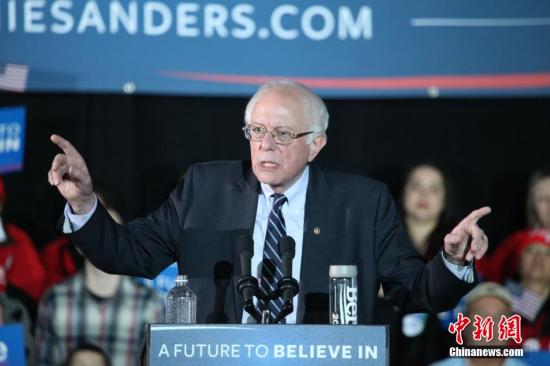China News Agency, Washington, February 26th: The tenth debate of the US Democratic presidential candidate: Siege on Sanders
China News Agency reporter Chen Mengtong
"I've always been heard to mention my name tonight. I want to know why?" Bernie Sanders, the US Democratic presidential candidate and federal senator, joked.
On January 31st local time, just one day before the start of the Iowa party meeting in the US presidential election, Sanders, a Democratic candidate, held a rally canvassing in Des Moines, Iowa. Photo by Deng Min, China News Agency
On the evening of the 25th, the tenth television debate of the Democratic Party's presidential candidate in South Carolina. Seven candidates stepped onto the stage and Sanders, who led the first three primaries, came to the center of the stage.
Less than 4 days before the South Carolina primaries vote, there is one week left until March 3, "Super Tuesday" (primaries are held on the same day in 14 states). For Democrats, this debate is arguably the most critical battle of all 12 primaries.
As soon as the debate began, Sanders became the focal point of fire. In the first 50 minutes, the topics were mainly related to the economy, medical insurance and gun control. Some candidates even gave up their self-policy advocacy and used all their speaking time to attack Sanders. The time-out of speeches, the rebuttal of refutations frequently appeared, and the scene was once in chaos.
Former New York Mayor Bloomberg took the lead in "attacks", implying that Sanders' policy position was "radical" and could not win the election. He bluntly said that if the Democratic Party nominates Sanders, it will help Trump get re-elected. Buttigieg, a former mayor of South Bend, Indiana, accused Sanders of misrepresenting the amount of donations given to him by billionaires.
Even Sanders '"ally", Federal Senator Warren also questioned Sanders' ability to lead the country. "Burney and I agree on many things, but I think I will be a better president than him."
Former Vice President Biden has grasped the history of Sanders who had voted for the gun-holding bill, slamming Sanders to protect gun manufacturers and sellers from legal restrictions.
The "New York Times" used "chaos" to describe the debate that night. "Between contestants' frequent meddling, angry intercourse and exaggerated waving, Sanders has suffered the most severe test yet."
Big companies with "universal health insurance", free higher education, and overthrowing "greedy" ... Sanders's style of debate has always been clear-cut and focused. But most of the night, he did not have much opportunity to proactively elaborate policies. Under the continued siege of Biden and Buttigieg and others, Sanders acknowledged that he had also had "bad votes."
The Associated Press commented that the night was a "sweet and bitter climax" in Sanders' decades of political career. For nearly 30 years, he has continuously challenged the Democratic "establishment", but suddenly became the object of the "establishment" challenge.
In the final summary question section, the moderator asked all candidates to talk about others' "misunderstandings" about themselves. Saunders said, "Misunderstandings are what you hear here tonight. I am not talking about 'radical' ideas, they exist in one form or another in countries around the world."
Saunders quoted former South African President Mandela as saying, "Everything is impossible until it happens."
"Super Tuesday" will be a "watershed moment" for Democratic candidates. US public opinion believes that the fierce clashes and quarrels that night were a reflection of how little time left for the Democratic "establishment" to block Sanders. The South Carolina Debate Night may be their best and last chance. (Finish)

